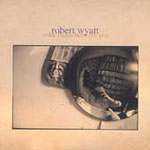This Unique Voice
| |

| Following the progress
of Robert Wyatt's career outside of his work with Soft Machine has been a constant source of delight. This may not have been how he envisaged it, of course. Having described himself as an out of work pop star he delivered his first solo album. Later he formed Matching Mole around ´an album of love songs' which
would have constituted his next solo effort. This band mutated into something
that delved into jazz rock territory all too familiar to his old band, though
with Wyatt at the helm, stamping it with some of his own idiosyncratic ideas. I can't help feeling though that it is a soloist, albeit one surrounded by like-minded individuals when required, that finds him at his true metier. ´Rock Bottom' and ´Ruth Is Stranger Than Richard' are both testament to this. They are fairly unique in that they are clearly Wyatt albums but have room for other voices, including those of equally idiosyncratic talents, like Gary Windo, Mongezi Feza and Ivor Cutler. And his role as interpreter of other people's songs is an area he has constantly explored with enormous artistic, though maybe not commercial, success. People talk of ´Robert Wyatt's 'Shipbuilding', for instance, since he stamped his own vocal identity on it. Then look at albums like ´Work In Progress' and ´Nothing Can Stop Us', the former offering the best version of ´Biko' ever, and the latter featuring such diverse re-workings as Chic's ´At Last I'm Free' alongside ´Strange Fruit' and ´Stalin Wasn't Stallin'. Of course, that album was also a very generously collaborative affair too with tracks given over to Bengali group Dishari and poet Peter Blackman. Now, this latest release collects material from the time of ´Rock Bottom' and ´Ruth' as well as more recent reunions with Hugh Hopper and one very contemporary song, ´The Verb', recorded at home and solo. Versions of ´Sea Song' and ´Alifib' are poignantly stripped down recordings of songs that would later be memorably embellished. Both are especially beautiful, spare, tender and almost unbearably moving. There is a moment, on the former, when he sings ´We're not alone' and the chord change transforms the piece into something even more uplifting. He also revisits ´Soup Song' which had some explosive playing from his accomplices at the time but still sounds great with just his voice and keyboards. Not many could deliver lyrics like ´Oh my god here come the onions' or ´There was a time when bacon sandwiches were everyone's favourite snack' and get away with it. But then this is the guy who once sang ´A Concise British Alphabet', forward and backward. He even had a ´hit record' too, taking Neil Diamond to a different listening public, perhaps. There's a solo version of that here as well. His newer ventures with Hopper are examples of the bass player's continuing fascination with tape loops and samples, as evidenced on his ´Jazzloops' cd. Here Wyatt is featured on ´Blimey O'Riley' playing cornet, looped and otherworldly, over Hopper's bass and samples. Their other joint effort, ´Twas Brillig' features more cornet and keyboards from Wyatt. It is buoyant, jazzy and demonstrates another facet of the man's versatile artistry. As does the title track. This is Wyatt solo and more abstract than his song-orientated self on the soundtrack for a short film which is also incorporated in the cd. Here he is exploring dark, multi-tracked keyboard textures with his voice as another instrumental tool. Gradually mutating, it becomes what Wyatt fans will recognise as part of ´Solar Flares' as it appeared on ´Ruth'. He indulges in other collaborations too; with one time progrocker Francis Monkman on various keyboards and partner Alfie Benge with friends in a BBC session from 1972. Some of these are a little more whimsical, like his vocal treatment of Richard Sinclair's ´Fol De Rol' from the first Hatfield & The North album and a bit of mock operetta in the shape of ´We Got An Arts Council Grant'. It may not cover every single meander of his career so far but this collection showcases some truly engaging examples of the man's unique voice and musicianship filled with passion, tenderness and humour. We should treasure him. © 2003Paul Donnelly |